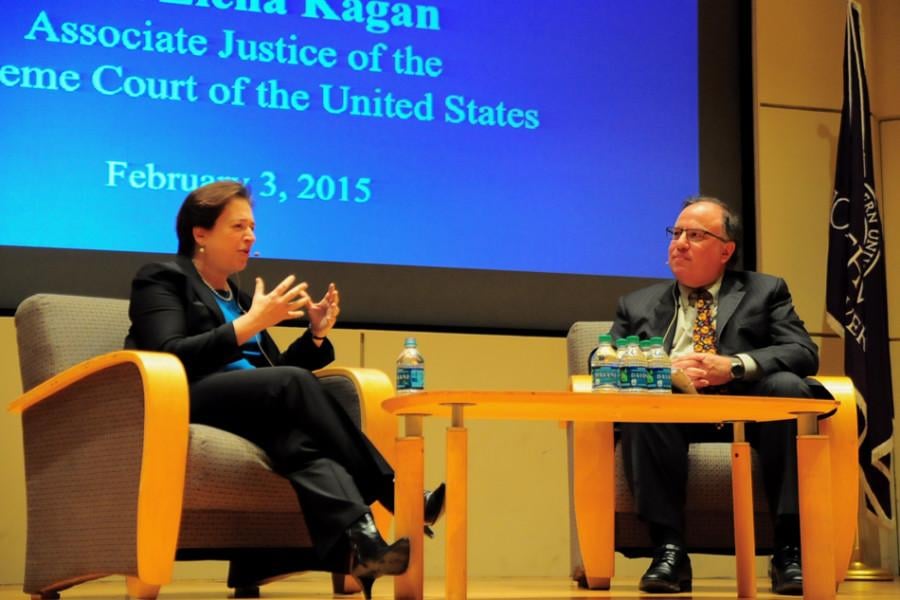Justice Elena Kagan visits law school, discusses law school model
Olivia Exstrum/Daily Senior Staffer
United States Supreme Court Justice Elena Kagan speaks at the Northwestern School of Law on Tuesday. During the talk, Kagan discussed the state of law schools and shared anecdotes about her experiences as a judge.
February 4, 2015
CHICAGO — Justice Elena Kagan spoke at the Northwestern School of Law on Tuesday about diversity in the court system and life as a justice.
Kagan spoke to a packed Thorne Auditorium and School of Law Dean Daniel Rodriguez moderated the event. The talk was part of the Howard J. Trienens Visiting Judicial Scholar Program.
“There’s something to be said about having an institution that reflects the country the institution serves,” Kagan said during the talk.
All nine Supreme Court justices attended Harvard Law School or Yale Law School. Kagan said although she doesn’t believe this affects the court’s decision making, she said the lack of diversity is “unfortunate.”
“It would be a really great thing if there was more diversity in legal backgrounds,” she said.
Kagan attended this year’s State of the Union address with five other justices. Because the justices are often unable to react to the speech out of fear of expressing partisanship, Kagan joked that the justices liken attending the event to acting “the potted plant.”
“It is a very partisan event,” she said. “I think the spectacle of it all is very interesting.”
During the talk, Kagan mentioned the hunting trips she frequently takes with Justice Antonin Scalia, which began during her confirmation hearings in 2010.
“I shot Bambi, it’s true,” Kagan said, eliciting laughs from the audience. “I couldn’t get an antelope, but I shot Bambi.”
Kagan said she considers U.S. Court of Appeals Judge Abner Mikva and the late Justice Thurgood Marshall, both of whom she clerked for, her two biggest mentors. She called Marshall, who was the first African-American justice, “the best lawyer of the 20th century” and said clerking for him as a recent law school graduate was an intense experience.
“He had unbelievable stories to tell,” she said. “It was opening this window to this incredibly important part of history.”
Kagan also discussed her experience with her four law clerks, who she said “want to be there all night and do everything.” She has had conservative clerks, she said, and likes hiring clerks that have different viewpoints from her own.
During the event, Rodriguez asked Kagan about the recent downturn in applications to law school and criticism of the law school model. Kagan said it’s not “sensible” for law schools to all be providing the same education.
“I do think that somehow there ought to be more than one mode of legal education,” she said. “There should be different ways of providing a legal education that reflect the market your students are in. I never quite understood why the elite law school model was the only one.”
During the question-and-answer session that followed the talk, law student Eunice Buhler asked Kagan if she had any advice for law students about to enter the workforce.
“What sort of practice and life advice do you have for those of us who will be beginning our lives in the law?” Buhler, who is in her final year at the law school, said.
Many law students think there is a certain career path they need to follow, Kagan said, and instead should be focusing on finding what moves them.
“I tend to think law students are too risk-adverse,” she said. “The most important thing in a professional life is to love what you’re doing. The future will probably take care of itself.”
Email: oliviaexstrum2017@u.northwestern.edu
Twitter: @olivesocean


